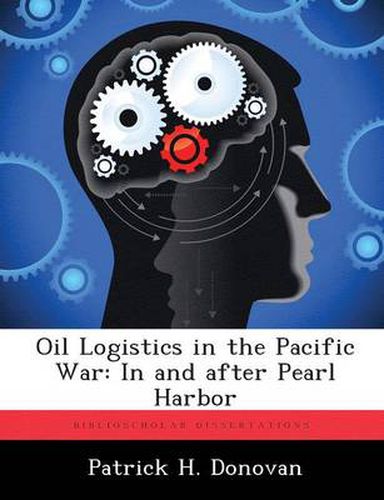Readings Newsletter
Become a Readings Member to make your shopping experience even easier.
Sign in or sign up for free!
You’re not far away from qualifying for FREE standard shipping within Australia
You’ve qualified for FREE standard shipping within Australia
The cart is loading…






This title is printed to order. This book may have been self-published. If so, we cannot guarantee the quality of the content. In the main most books will have gone through the editing process however some may not. We therefore suggest that you be aware of this before ordering this book. If in doubt check either the author or publisher’s details as we are unable to accept any returns unless they are faulty. Please contact us if you have any questions.
This research paper focuses on oil and its importance to operations in the Pacific during World War II. It specifically concentrates on the period before Japanese-U.S. hostilities, through the strike on Pearl Harbor, and concludes with operations in the Solomon Islands. A secure and reliable source of oil was one of the primary reasons that Japan chose to go to war with the United States that fateful Sunday in December 1941. The Japanese understood their country’s need for oil and other resources, but never conformed their military strategy to achieve their national objective of economic self-sufficiency. The Japanese Navy pedantically espoused a maritime strategy that required the United States Navy to fight a war according to the Japanese playbook. The Japanese Navy never understood the importance that oil, including its storage and transportation, had to all Navies that tried to steam the great expanses of the Pacific. This lack of logistical foresight was to eventually play a major role in Japan’s defeat in the Pacific. Commanders and their staffs must never forget the importance operational logistics plays in achieving operational and national objectives. This research provides the reader a valuable example of the importance of logistics in the execution of operational strategy while pursuing national goals. Although it is valuable to learn from one’s own personal mistakes, it is usually less painful to learn from someone else’s error, and thereby ensure that their blunder does not become your own.
$9.00 standard shipping within Australia
FREE standard shipping within Australia for orders over $100.00
Express & International shipping calculated at checkout
This title is printed to order. This book may have been self-published. If so, we cannot guarantee the quality of the content. In the main most books will have gone through the editing process however some may not. We therefore suggest that you be aware of this before ordering this book. If in doubt check either the author or publisher’s details as we are unable to accept any returns unless they are faulty. Please contact us if you have any questions.
This research paper focuses on oil and its importance to operations in the Pacific during World War II. It specifically concentrates on the period before Japanese-U.S. hostilities, through the strike on Pearl Harbor, and concludes with operations in the Solomon Islands. A secure and reliable source of oil was one of the primary reasons that Japan chose to go to war with the United States that fateful Sunday in December 1941. The Japanese understood their country’s need for oil and other resources, but never conformed their military strategy to achieve their national objective of economic self-sufficiency. The Japanese Navy pedantically espoused a maritime strategy that required the United States Navy to fight a war according to the Japanese playbook. The Japanese Navy never understood the importance that oil, including its storage and transportation, had to all Navies that tried to steam the great expanses of the Pacific. This lack of logistical foresight was to eventually play a major role in Japan’s defeat in the Pacific. Commanders and their staffs must never forget the importance operational logistics plays in achieving operational and national objectives. This research provides the reader a valuable example of the importance of logistics in the execution of operational strategy while pursuing national goals. Although it is valuable to learn from one’s own personal mistakes, it is usually less painful to learn from someone else’s error, and thereby ensure that their blunder does not become your own.